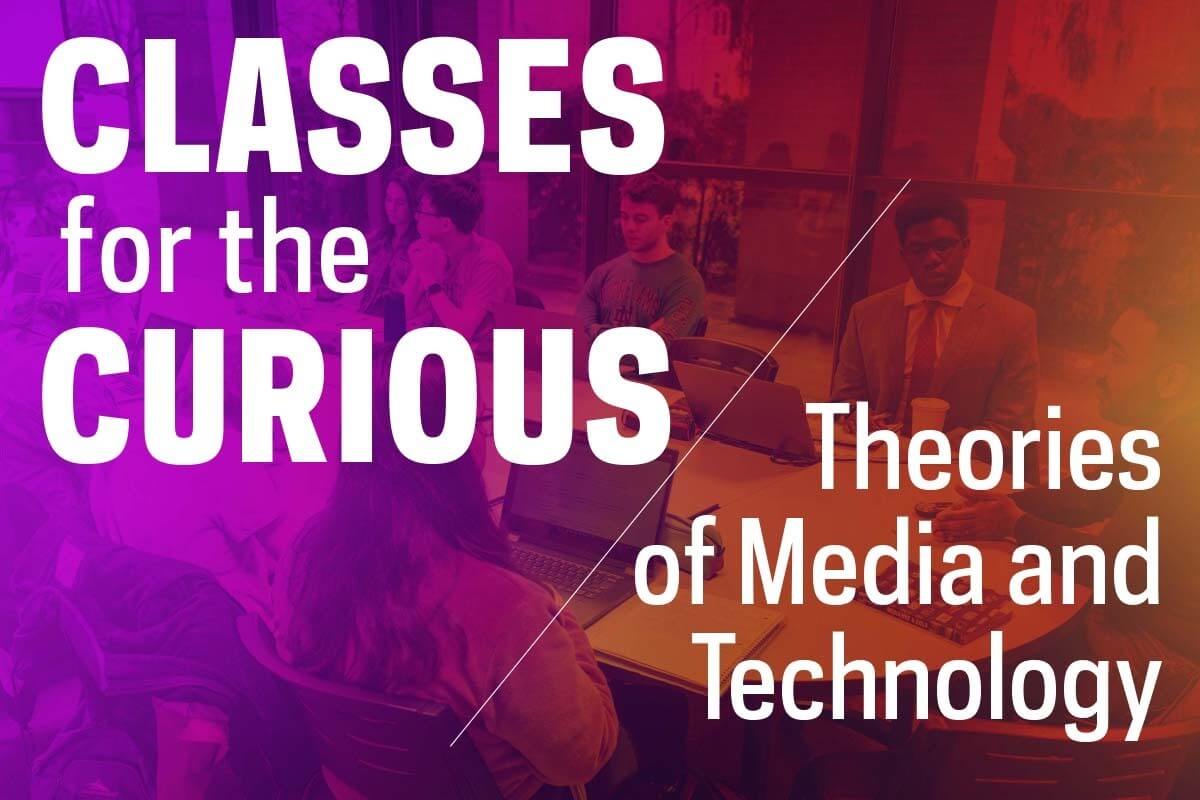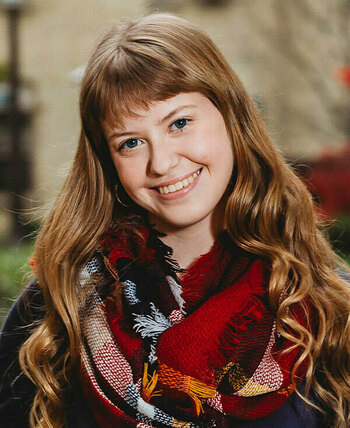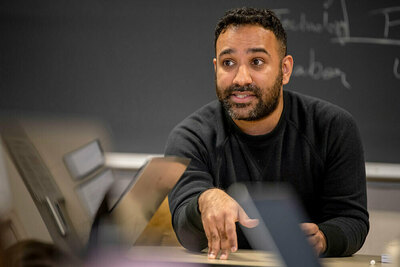
The class: Theories of Media and Technology
The professor: Ranjodh Singh Dhaliwal, the Ruth and Paul Idzik Assistant Professor in Digital Scholarship and English
The focus: A multidisciplinary introduction to an array of theoretical approaches to understanding media and technology, including film, TV, video games, the internet, and social media. Critical theoretical understandings of media and culture are also used to help understand other topics such as politics, philosophy, language, and literature.
The syllabus: Assignments include academic essays, journalism, and book chapters on a range of media and technology topics from clocks to video games; Ursula Le Guin’s The Carrier Bag Theory of Fiction; Ted Chiang’s science fiction short story “Exhalation,” John Berger's BBC TV series Ways of Seeing, the film The Matrix; recorded talks and lectures, and more.

Junior Kaylee Kern took Theories of Media and Technology in the spring of her sophomore year, and she credits the course for changing how she consumes and understands all forms of media, from books to movies to memes.
An English major with a minor in Irish language and literature, Kern took the course to fulfill an English requirement, but appreciated how the class was also crosslisted in film, television, and theatre (FTT); computing and digital technologies; science, technology, and values; and history and philosophy of science. She said that allowed the class, taught in a seminar style, to tackle various types of media properly by approaching course material from a diverse set of perspectives.
The following Q&A has been edited for clarity and brevity.
What’s the most important concept you have learned in Theories of Media and Technology?
The most eye-opening concept was the main idea of the entire class — that it’s not only the content and the information that you consume, but it’s the form in which you consume it that matters and carries a message all of its own. That’s really been eye-opening, both in the class and since then, because now I look at all the media that I consume differently.
How is it that you look at the information you consume differently?
Well, my mindset has changed. Instead of just picking up a book and thinking about the words that are in it, now I look at the design of the book and think about why they designed it the way they did. I look at which edition it might be, how many versions came before it, what materials it’s made out of, even thinking about the production of paper and what it means that they decided to print physically, instead of putting it online or releasing it in installments. Every decision about the production of that piece matters, not just the words that are in it, and I wouldn’t have thought about that before this class.
How did Professor Dhaliwal’s teaching style and course content help you understand these concepts?
The teaching style was great because it was discussion-based. Everyone would have a large conversation together about primary source materials that we encountered. We read lots of essays by philosophers and theorists about different types of media, then we came together. It was a really open and inviting environment because Professor Dhaliwal acknowledged to us immediately that it could be difficult material to read, but we weren’t made to feel as though we could never understand it. He really walked us through the process of reading texts and made sure we knew the most important parts.
I was intimidated going in at first, and very quickly, I realized that he was going to help us every step of the way. It’s also really cool because the class involves a lot of cross-listed subjects, so I took it as an English class. But there were also people from computer science, FTT, and a couple of other majors, so you had a lot of different perspectives around you. If there was a type of media that wasn’t familiar — I know books well, but movies aren’t always my forte — but there are people in the room who know those things. Bringing in all of those different voices, he allowed those voices to speak, so we all helped each other.
What course material were you assigned to do for each class session?
I would call the class reading heavy, but I don’t think that that should scare anybody away. It would take a lot of time and effort to get there, so Professor Dhaliwal really encourages you to just read and get what you can out of it. Then, we will work together to understand the rest, so it’s not as scary as it might seem initially.
There were also assignments where we would respond to the readings with our own personal impressions, or how we could personally connect our lives to something that we read. For example, if we did a reading on how photographs affect us, we could connect it to pictures that we’ve seen, or think about pictures that we’ve taken ourselves and identify those elements in the pictures and how those might speak to other people. It was really cool, then, to put out our own thoughts on some of these abstract theoretical concepts, and see other people’s thoughts on them, and then have a really grounded understanding of how they work.
“(This class) has really broadened my mind of what English is. Because a lot of people think of English as ‘it’s just reading books and analyzing books and writing about books.’ And it’s so much more than that. Analyzing words and analyzing meaning in written material, that can be anywhere.”
How has this course been beneficial in applying your knowledge to the real world as well as preparing you for future courses in your academic career?
It had a lot to do with learning to look at every aspect of information and how a body of work is produced, not just regarding the words themselves, and taking into account the form and the media. And going into other classes, I have borne this in mind by thinking about where a novel comes from, not just how it’s sitting in front of me right now.
But then thinking about even the future in the fields I study, it has really broadened my mind of what English is. Because a lot of people think of English as “it’s just reading books and analyzing books and writing about books.” And it’s so much more than that. Analyzing words and analyzing meaning in written material, that can be anywhere.
Even right now, I’m considering looking into library science after I graduate, and to look into library science fully, you have to think about more than just books. It’s about the organization of materials and how things are presented digitally now. There are lots of different ways to access things, and I wouldn’t be as prepared for that if I hadn’t taken this course.
What advice would you give to incoming students looking to take this course?
Take the leap. Be brave. Be prepared for a challenge, but know that it’s going to be worth it and it’s not supposed to be scary. Do the work to the best of your ability and ask for help when you need help, because Professor Dhaliwal is always available to answer questions. He was really approachable and available all the time to help, so all you have to do is ask. It’s just helpful to go into the class knowing that you’re gonna have a professor who understands already that the material is difficult, so you’re not working with somebody who’s expecting anything that you’re not already capable of doing.

What has been the most enjoyable aspect of this course?
The broad range of materials that we covered. Theory classes can sound really intimidating. It’s one of the requirements for English majors, and we’re all afraid of it. And then I get to this class, and I see that we’re looking at the history of paper all the way to memes. We’re covering a huge range of media and how it affects us, and we get to analyze newspapers, books, movies, simulations, simulacra, and photographs. Your entire life becomes encompassed in what you’re studying and you start to notice these things everywhere. Walking around campus and seeing things in a completely new way because of something you just talked about in class — that was fascinating.
Talk about your unique final paper for this class. What was that experience like?
Yeah, so our final project was really open for creative interpretation in general. There were a lot of different avenues that people could go down. They could write a regular paper, there was the option to create a video game if you wanted to, you could come up with your own project and present it to him.
He was really open to all ideas, and a medium that I use all the time is lists. I live off of lists — everything I do is in list form, and that helps me stay organized, but I never even considered it as a medium before. I brought the idea to Professor Dhaliwal, and he said, “Well, only a few people have done research on that, but there’s no reason why you shouldn’t.” I was nervous about it, but I had multiple conversations with him throughout the process and it really gave me a lot of confidence.
I ended up writing a really long paper, with the page number probably in the 40s, about lists — and the whole thing was in the form of a list. I compared lists that I made to other kinds of lists, how people make them, what making lists does to them and their ideas, what format lists are written in, and what material they’re written on. Then I analyzed why it matters that lists are a different form of writing than an essay or letter. It was so introspective and I really didn’t know how much it was going to affect me personally until I had done it.
It was kind of an emotional process to dive that deeply into the way that I think on a daily basis. It was a big idea and I wasn’t sure how to tackle it, but I can look back now and say that one of the things I’m most proud of doing in college is that project. Professor Dhaliwal encouraged me to step outside of my box and try something that I might not have otherwise.
“It was a big idea and I wasn’t sure how to tackle it, but I can look back now and say that one of the things I’m most proud of doing in college is that project. Professor Dhaliwal encouraged me to step outside of my box and try something that I might not have otherwise.”


